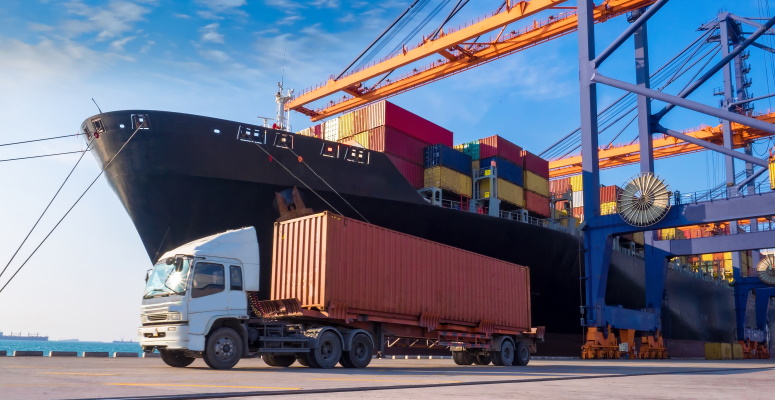
Month in Review – June 2024
Maritime
June 4: Ocean Contracts Under Strain Amidst Red Sea Diversions – Freightos blog
Capacity already stretched thin by Red Sea diversions is combining with an unexpected increase in demand in recent weeks to send ocean container spot rates spiking, and poses familiar challenges to shippers with long-term contracts.
Demand for ocean freight out of Asia unexpectedly picked up early in May, reflecting the possible start of restocking in Europe and an early peak season on the transpacific due to concerns over Red Sea or labour-driven delays later in the year. As a result, congestion began to worsen, and the supply side deficits began to be felt as empty container shortages in Asia and spiking rates.
Since the end of April, Asia to North America West Coast spot rates, for example, have spiked more than 70%, passing the $5,000/FEU mark and their previous 2024 high hit in February, when prices first soared on the start of Red Sea diversions.
With capacity and equipment scarce and spot rates now several thousand dollars above long-term contract levels, annual agreements are once again becoming unreliable.
A recent Freightos Group survey of more than 50 logistics professionals found that, since early May, nearly 70% of BCOs and forwarders with long-term ocean contracts have had containers rolled or pushed to the spot market, or are facing contract renegotiations with carriers to increase their long-term rate levels.
June 10: French Ports Face a Month of Chaos and Disruption as Workers Strike – The Loadstar
A month of chaos and disruption could lie ahead for France’s major ports, including box hubs Le Havre and Marseille-Fos.
Labour unions representing dockers and other port workers look set to carry out their threat to stage several one-day strikes, as well as numerous four-hour work stoppages this month, in protest over pension reform that increased the statutory retirement age in France.
The first of the 24-hour strikes took place on June 7, with Le Havre’s ro-ro, bulk and container terminals reportedly blocked by dockers. Four ship calls were cancelled and a further 18 calls delayed. The same day, an estimated 600 dockers and other port workers blocked the main entry point of trucks at the Fos box terminal.
Among the other French ports hit by the stoppages are Dunkirk, Rouen, Bordeaux and Nantes Saint-Nazaire.
June 10: ILA Suspends Talks, Warns of “Little Faith” in Reaching Deal on Time for U.S. East Coast, Gulf Coast Ports – The Maritime Executive
The International Longshoremen’s Association is continuing its tough stance against port automation, announcing on June 10 the suspension of contract negotiations due to an issue over automated gates. Noting it is only four months until the master contract expires covering all U.S. East Coast and Gulf Coast ports, the ILA said in its statement that it has “very little faith that these issues will be addressed in time.” In the past, the union has said it will not go past the September 30 expiration and would strike.
The suspension came just one day before the ILA and the United States Maritime Alliance (USMX) were scheduled to meet for talks regarding the master contract. Talks have been underway since last year for the local contracts with the goal of having completed that phase and now moving into the master contract. The ILA says it will not meet with USMX until the current automation issue is resolved.
June 11: Blank Sailings on the Rise at Canadian Ports as Carriers Fret over Potential Rail Strike – The Loadstar
As uncertainty hangs over Canada’s rail system being shut down by a strike, shipping lines on the transpacific trade have begun to cancel calls to the country’s main pacific gateways, Vancouver and Prince Rupert.
“Anticipation of a strike keeps carriers on their toes, with some already taking significant action to omit, blank or swap calls into Vancouver in June and beyond,” an eeSea trade update said.
“There are 14 port swaps and diversions away from Canada into U.S. gateway ports confirmed from week 24 onward, as well as three completed since mid-May,” it added.
June 13: Carriers Scramble for Tonnage – The Loadstar
Ocean carriers are “scrambling for any tonnage” to provide additional capacity on east-west services, but the tonnage providers are “taking advantage” as the cost of chartering vessels has recently risen rapidly.
Maersk’s head of ocean product UK and Ireland, Joe Knight, said at this week’s Multimodal exhibition in Birmingham: “Vessels are fully utilized and that’s why there are new services coming online, which honestly is great for the industry, to get as much pressure out as possible.
“They are very small vessels, in relative terms to the Far East norm. So, you’d be expecting to run 20,000-TEU or 14,000-TEU vessels, and we’re seeing 3,000-TEU ships being deployed,” he added.
Peter Sand, chief analyst for analytics platform Xeneta, said: “All carriers fight for the same ships – either you buy or you charter – and they are all scrambling for tonnage now. There is big money to be made, at the expense of shippers who get only to pay more and more for deteriorating service levels.”
June 13: Fears Are Rising that Ocean Freight Rates May Surpass US$20,000 with No Relief for Global Trade into 2025 – NBC
A major global trade inflation indicator is headed in the wrong direction. Rising freight rates are a new source of concern in the global supply chain, with forecasts warning that ocean cargo prices could reach $20,000 – potentially even touch the COVID-era peak of $30,000 – and stay there into 2025.
Spot ocean freight rates from the Far East to the U.S. popped between 36% and 41% month over month, and ocean carriers increased additional charges known as general rate increases by roughly 140%, according to the CNBC Supply Chain Heat Map. These costs have taken the price of a 40-foot cargo container to about $12,000.
June 14: More Strikes at German and French Ports Could Bring Congestion and Delays – The Loadstar
Port workers affiliated with German trade union Ver.di have threatened strike action at the country’s key hubs, adding to North European shipper stress as labour tensions also rise in France.
Ver.di is organizing a series of dock strikes in Bremerhaven, Hamburg, Bremen and Emden after talks with the Central Association of German Seaport Operators (ZDS) ended without success.
Negotiations will continue in Hamburg on June 17 and 18, but a warning strike took place on June 14 in Emden, and Ver.di said: “It remains to be seen whether there will be another warning strike, if the ZDS does not submit an offer in the next round of negotiations.”
The union said that, in 2022, warning strikes that accompanied talks “paralyzed the ports for around 80 hours.”
June 17: ‘At Least 65 Countries’ Now Affected as Houthi Red Sea Attacks Continue – The Loadstar
Houthi attacks on shipping in the Red Sea have cut box throughput in the region by 90% and, amid escalating insurance costs, it seems it will take more than naval support to lure carriers back to the region any time soon.
According to a U.S. Defense Intelligence Agency report, re-routing vessels around Africa has added some 11,000 nautical miles and $1 million in fuel costs to voyages, but from a financial perspective, this compares favourably with taking Red Sea routes in crisis conditions.
To date, the report notes, “at least” 65 countries have been affected by the attacks, well outside the Houthis purported scope.
June 18: Snap Election in France Prompts Labour Unions to Postpone Strikes at Ports – The Loadstar
The surprise announcement by French president Emmanuel Macron last week to call an election has led to dock and port worker unions postponing a series of strikes this month, which threatened to bring chaos to box ports like Le Havre and Marseille.
A 24-hour stoppage on June 7 saw Le Havre’s ro-ro, bulk and container terminals reportedly blocked by dockers, leading to four ship calls being cancelled and a further 18 delayed, while at Marseille-Fos, an estimated 600 dockers and other workers blocked the main entry point to the box terminal.
Further one-day strikes had been called for June 21 and 25, along with four-hour walkouts on three days of each week this month – all in protest at pension reform that increased the statutory retirement age in France.
However, the snap election left traditionally militant union Fédération Nationale des Ports et Docks CGT (FNPD) with no one at government level with whom to negotiate its demands until a new administration is formed.
June 21: Singapore Port Logjam Lingers as Container Ships Keep Piling In – gCaptain
The logjam that’s been plaguing Singapore’s container port is bringing forward this year’s peak season for the shipping sector, spelling trouble for businesses in the city-state.
The bunching up of container vessels outside one of the world’s busiest maritime trade hubs means there’s more cargo trapped in ports for longer. That’s pushing freight rates ever higher, with no immediate end to the congestion in sight.
A lack of immediate alternatives to Singapore in the region is making the logjam even worse. Nearby ports, such as Port Klang and Tanjung Pelepas in neighbouring Malaysia, aren’t easy substitutes because they aren’t as well-connected as Singapore, said Jayendu Krishna, a director at Drewry Maritime Services. So outbound cargoes may not be able to reach their destinations on time if they don’t leave from the city-state, he said.
June 26: Idle Containership Fleet Dips to Pandemic-Era Lows as Carriers Hunt Tonnage – The Loadstar
As global demand for box ship capacity continues to dramatically outstrip supply, the number of idled vessels is down to numbers not seen since the pandemic.
According to new Alphaliner data, in the first half of the year, commercially idle tonnage represented an average of 0.7% of the container shipping fleet, “harking back to levels seen during the pandemic,” it reported.
Stanley Smulders, director of marketing and commercial for ONE, said: “If you look at all the statistics, there are no ships idle. All the shipping lines are in need of ships at the moment.”
June 27: Forwarders ‘Being Squeezed’ as Spot and Contract Rates Move Further Apart – The Loadstar
Rapidly increasing spot freight rates are diverging further from contract rates, imitating the pattern seen during the pandemic, leaving large shippers in a better position than SMEs and freight forwarders, according to freight rate benchmarking platform Xeneta.
Xeneta market analyst Emily Stausboll said: “Some of our customers are saying this brings back pandemic memories, and there are very few that have pleasant memories from that time.”
Xeneta chief analyst Peter Sand warned that “what you pay depends on you either being very very good at negotiating, if you are a super-large shipper or you are an SME shipper.”
According to Xeneta data, SMEs are often paying more than the market average, whereas larger players on average pay less, due to carriers honouring long-term contracts to maintain relationships.
June 28: Disruptions Grow at German Ports as Labour Talks Drag On – The Maritime Executive
Germany’s powerful union Ver.di is continuing to stage a series of “warning strikes” rolling across the main German commercial ports as the union says they are “still far apart” on contract negotiations.
The latest effort was on June 27, with both the day and night shifts stopping work at Wilhelmshaven.
Carriers are continuing to warn customers of potential impacts on their schedules as Ver.di says that there could be additional strikes before the next round of talks, which is not scheduled for nearly two weeks.
Maersk issued an update to customers saying that it was “reviewing vessel line ups and schedules, as well as potential impact of the strike action on vessel departures. We are looking into taking additional measures, such as diversions or move count restrictions in order to minimize the impact on onwards vessel schedules, and consequently, delays to our customers’ cargo.”
Air
June 14: Worsening Containership Market Keeps the Pressure on Air Cargo – Air Cargo News
The recent deterioration in the ocean shipping market could be pushing more cargo to airfreight following the impact of the Red Sea crisis.
In its latest market update, data provider WorldACD said that, over the last few weeks, air cargo demand and rates from Asia Pacific origins “continue to soar well above last year’s levels.”
Its figures show that, in the last two weeks, overall Asia Pacific tonnages are up 20% year on year and rates are 16% ahead of the year-ago level, although WorldACD pointed out that there are some big variations between origins.
This comes as ocean shipping – already under pressure due to the Red Sea crisis – has seen volumes and rates soar due to unseasonal capacity shortages and port congestion.
“Shippers face significant shortages of both air and ocean freight capacity due to strong demand and disrupted seafreight services,” the data provider said.
June 19: WestJet Cancels Some 40 Flights in Anticipation of Strike by Mechanics – CHEK News
The WestJet Group cancelled about 40 flights in anticipation of a possible strike by its aircraft maintenance workers on June 19.
WestJet says it started cancelling and consolidating its flights in order to park aircraft in a safe and organized manner.
Some 670 WestJet mechanics, represented by the Aircraft Mechanics Fraternal Association, are poised to walk off the job as early as June 20 after serving the airline with strike notice earlier this week.
The flight cancellations came as WestJet waits for a response to its request that the Canadian Industrial Relations Board intervene.
If accepted, the move would refer the dispute to arbitration and prevent labour action by both sides, the company says.
June 20: WestJet and Unionized Mechanics Agree to Resume Talks; Strike Action Off the Table – CP24
The threat of strike action by unionized mechanics at WestJet has been dropped after both sides agreed to return to the bargaining table.
A statement says the air carrier appeared before the Canadian Industrial Relations Board to discuss arbitration options with its Aircraft Maintenance Engineers and Tech Ops employees. CIRB officials say more information is needed from both sides before deciding whether arbitration is the best way to reach a first-time collective bargaining agreement.
In the meantime, the parties have jointly agreed to return to the bargaining table and continue working towards a resolution.
June 27: Government Steps In to Prevent WestJet Engineers Strike Ahead of Holiday Weekend – Reuters
Canada’s federal government intervened on June 27 to prevent a strike by maintenance engineers at WestJet Airlines to avoid more flight cancellations ahead of a busy holiday weekend.
Labour Minister Seamus O’Regan said he had ordered the country’s industrial relations board to impose final binding arbitration in the dispute between the airline and the Aircraft Mechanics Fraternal Association. “The parties still remain far apart today, and tensions have only increased,” he said in a statement.
The union said there was no modern precedent for the move, adding it would comply with the order and direct its members to refrain from any unlawful job action.
Trucking
June 10: Zero- and Low-Emission Trucks to be Tested at Port of Prince Rupert through B.C.’s Integrated Marketplace – PRPA press release
Through an Integrated Marketplace project led by Innovate BC, new zero- and low-emission heavy-duty (HDZEV) trucks will be added to operations at the Port of Prince Rupert to help reduce greenhouse gas emissions and support sustainability in the province’s transportation sector.
The HDZEV project will see four new trucks – two hydrogen powered, one battery electric and one hydrogen-diesel co-combustion – utilized on existing operational routes. These operations will provide data to better understand the range, reliability and potential best use case for the vehicles.
June 10: CVSA Brake Safety Day Blitz in Canada Puts 11.5% of CMVs Out of Service – Today’s Trucking
More than one in 10 commercial motor vehicles that were inspected in Canada were put out of service for brake-related violations during Commercial Vehicle Safety Alliance’s (CVSA) recent one-day unannounced blitz.
Inspectors in nine Canadian provinces and territories conducted 1,021 inspections, in which 904 of the vehicles inspected did not have any brake-related out-of-service violations. They removed 117 vehicles from roadways for brake-related out-of-service violations, which is an 11.5% vehicle out-of-service rate. Additionally, 33 power units and 18 towed units had brake lining/pad violations.
June 11: Companies Looking to Reduce Emissions Turning to Private Fleets – Transport Topics
Across all areas of the economy, shippers are facing increasing pressure to make their operations more sustainable and to meet environmental, sustainability and governance (ESG) targets.
That has some companies looking to exercise greater control over GHG emissions in their logistics networks by stepping back from for-hire carriers and increasing their private fleets.
June 14: U.S. FMCSA Approves 25% Fee Increase for Carriers, Brokers – FreightWaves
U.S. federal regulators have approved a 25% increase in fees collected by states from motor carriers, brokers and leasing companies that are used to pay for state highway safety programs.
The fee increase in the Unified Carrier Registration (UCR) Plan for the 2025 registration year, announced on June 14 by the Federal Motor Carrier Safety Administration, ranges from $9 to $9,000 more per year that carriers will pay, depending on the size of their fleet. The fee per entity for a broker or leasing company is $46.
“The agency notes the rare occurrence of this upward adjustment, which has only previously occurred once, over a decade ago,” FMCSA stated in a final rule approving the increase.
June 26: Canadian Truckers Worried as U.S. Dog Import Rule Deadline Approaches – Today’s Trucking
Effective August 1, the U.S. Centers for Disease Control and Prevention (CDC) will enforce new entry requirements for dogs traveling across the border to prevent the spread of rabies. All dogs must appear healthy, be microchipped and be at least six months old, and owners must present a CDC Dog Import Form receipt upon arrival.
The Canadian Trucking Alliance (CTA) has voiced concerns about these regulations, particularly for cross-border truck drivers who frequently travel with dogs.
According to a news release, the upcoming rule has CTA members worried about condensed timelines, burdensome compliance requirements and potential adverse health effects that could endanger the well-being of their dogs if specific revaccination requirements remain in place.
“CTA recently wrote the CDC, indicating that many cross-border truck drivers travel with their pets as a companion, with some fleets estimating that upwards of 20% of their long-haul drivers travel with their dogs into the U.S. Many drivers also have questions about potential impacts on admissibility, and the lack of education around this rule prior to its introduction at the border,” the release reads.
Since the CDC has recognized Canada as a low-risk country for rabies, CTA has requested an extension of the educational enforcement period until the end of 2024 and advocated for already-vaccinated dogs to be grandfathered into the new regulations, regardless of microchipping status.



